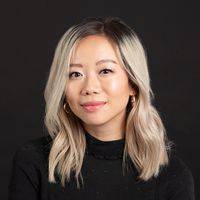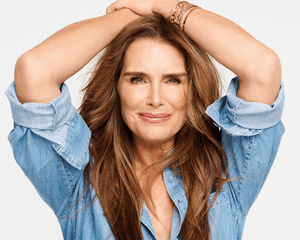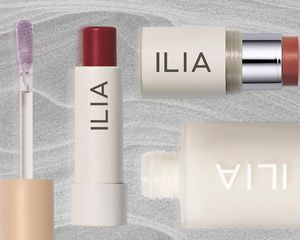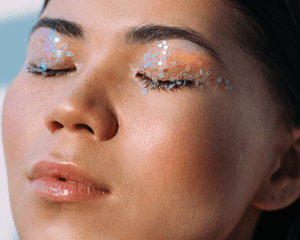On my way to interview Zoë Kravitz, I get caught in a thunderstorm. It’s one of those sudden downpours that happens often in the transition between summer to fall in New York City—an invisible tug-of-war between the seasons crescendoing into a clap of thunder, then a torrid rush of rain. It always feels like a release. While en route, I also narrowly avoid a swerving taxi, get leered at by a stranger on the corner of Broadway and Mulberry, and walk past a pile of garbage bags stacked five feet high, emanating the pungent, overripe smell of SoHo in the summertime. September in New York is nothing if not predictable.
Equally predictable is the enthusiasm I’m met with when I inform people—friends, co-workers, random acquaintances—that I would be interviewing Zoë Kravitz (though perhaps gushing fervor is a more fitting descriptor). “Cool” and “chill” are two words that a lot of people repeat when describing her, along with “dream girl.” I’ve interviewed Kravitz before—a brief, five-minute exchange in Los Angeles a few years ago, right before she performed on stage with her band Lolawolf. Calm and unruffled, she appeared almost inhumanly zen, considering the electric hum of the growing crowd just outside the green-room door.
Today, there’s no buzzing commotion outside—just Kravitz and me, perched on a blue velvet couch on the fourth floor of YSL’s Beauty Hotel pop-up, moody gray light streaming through the open window behind us. She compliments me on my shoes, exuding the same easy, slow air I remember from two years ago. If Kravitz were to get an aura reading, I’d predict her photograph would be filled with a hazy, warm wash of deep blue or violet. Serene, composed, and unbothered. Cool.

A few weeks prior, YSL released the newest campaign for its cult fragrance Black Opium, featuring Kravitz in a sheer black blouse, hair chopped into a pixie, the blurred lights of what looks like the New York skyline behind her—a portrait of the ultimate alluring city girl. I ask her what it’s like to be one of the first and only women of color to be the face of a couture fragrance campaign, something she points out herself in an Instagram post promoting it.
“It feels amazing. It’s funny because I didn’t really think about it so much when I was doing the campaign. I was excited because I was excited. After doing a bit of research and seeing how few brown women are faces of couture fragrances, I was like, wow, this is a big deal,” she tells me with a smile. “Hopefully it will open the eyes of these major fashion houses to expand their idea of beauty and how they represent beauty.”
Speaking of beauty, now should probably be the moment to confirm that yes, Kravitz is as unnervingly beautiful in person as she is on screen. Her hair falls across her shoulders in microbraids that morph into lazy waves, her lips appear naturally cherry-stained, and I can’t stop staring at her skin, which seems to lack any visible evidence of pores (she credits the serum and eye cream from high-end natural skincare line Retrouvé, as well as a 30-day detox by Dr. Schulze in Los Angeles that her mom and her do together every year). Though she’s currently sitting across from me wearing a slouchy YSL T-shirt and tight black miniskirt, her demeanor is more like someone chilling with a friend in her own home. She’s wearing Lucite heels, but she might as well be in sweatpants and house slippers.
“To me, beauty is an attitude, you know?” she muses, her (expertly lined) eyes slightly widening. “When I see someone who is comfortable in their own skin and knows who they are, I think that’s gorgeous. I’ve seen so many people who on paper are ‘beautiful,’ and there’s just nothing behind the eyes—they’re totally insecure, and all of a sudden, the beauty doesn’t mean anything, and I don’t find them beautiful anymore. That beauty lasts about two seconds.” She pauses and smiles at me again, uncrossing her legs and unfurling even deeper into the couch. (Also confirmed: Kravitz’s beauty lasts much longer than two seconds.)

In case it hasn’t been made painstakingly clear: Zoë Kravitz is undeniably, unequivocally cool. As the offspring of the Lisa Bonet and Lenny Kravitz, she seemed destined to be born into the club of the unperturbed and effortlessly glamorous. Her professional career has certainly followed the trajectory—she’s acted in both blockbuster movies as well as indie darlings, made her HBO debut as the (seemingly) serene Bonnie in the blowout show Big Little Lies, and starred in the much-awaited Harry Potter spinoff sequel Fantastic Beasts: The Crimes of Grindelwald, as well as the ’80s punk band film Viena and the Fantomes alongside Evan Rachel Wood and Dakota Fanning. Oh, and she sings wistful songs on the side with her aforementioned band Lolawolf, named after her half-siblings. Like most members of the club of cool, Kravitz swears to me she had an awkward phase (“I was constantly struggling to figure out who I was”), believes that everything is best in moderation when it comes to diet (“I don’t believe in depriving yourself”), and considers the holy trifecta of water, exercise, and sleep the secret sauce to her supernaturally glowing skin. Though certainly genuine, none of these things is especially surprising.
:max_bytes(200000):strip_icc()/zoe-embed-3-9b8e135443624f4ea1908914691540bc.jpg)
Emily Soto/Design by Tiana Crispino
What is surprising is the way Kravitz pauses for a beat longer than you’d expect after each of my questions, weighing her answers thoughtfully. Also surprising is her frankness, especially in discussing vulnerability. “It definitely took me some bit of time as an adult and someone who was in the public eye to find myself,” she admits. “There’s a lot of pressure. Growing up, I’d go to events and think, Do I need to look like everyone else?” She credits her glam team—makeup artist Nina Park, hairstylist Nikki Nelms, and stylist Andrew Mukamal—for helping her come into her own, openly gushing about them enthusiastically the same way most people gush about her. Nowadays, Kravitz is a veritable beauty chameleon, debuting a peroxide buzz cut one day and dramatic negative-space eyeliner the next. But you get the impression her vacillating beauty isn’t the result of a person searching for her identity, but rather someone who’s already found and is thoroughly enjoying exploring and expressing its many facets. (That, and the fact that her bone structure practically guarantees lack of any beauty error.)
When I ask about her broader influences, Kravitz is quick to praise the many people in her life for shaping her into the person she is today—namely, the women. “My mom had such an incredible group of women around her,” she says of her youth. “Seeing that kind of support and seeing how that changed her life, I think from an early age I knew that was something that was important to me.” Aside from her godmothers, Marisa Tomei and Bri Summers, Kravitz names her co-stars on the hit HBO show Big Little Lies as “amazing, amazing” women who have all influenced her life and become some of her “best friends in the world.” The more Kravitz talks about these individuals, the more she visibly lights up. This is not someone who downplays the role of those she surrounds herself with or holds back admiration to feign aloofness.
“Reese [Witherspoon] is doing so much in terms of business and family and producing and writing,” she says to me with an air of genuine reverence. “She just never stops, and yet she still loves it and has a smile on her face and takes great care of her family and is a great friend. … She’s someone who is able to really balance all of that, and it’s amazing.”

We begin to discuss what it means to be a strong female in today’s political climate, when it feels like our rights are being diminished by the day. “I think [it’s about] just speaking your mind and not being afraid to be disliked,” Kravitz says. “That’s a huge thing, not only in the industry, but in culture—specifically American culture. Women are all about being pleasant, and life isn’t always pleasant.”
“You know when a guy on the street tells you to smile?” she asks. I nod, thinking back to the leering stranger I encountered earlier. It’s an infuriating, altogether familiar experience most women have probably experienced one or more times in their lives—the idea that whatever you’re going through is completely irrelevant to the fact that you exist solely for the male gaze. “So lately, I’ve been doing one of two things,” Kravitz continues. “I’ve either been looking them in the face and saying, ‘Don’t fucking tell me to smile,’ or I’m like, ‘My grandmother just died.’” She pauses for a beat, then laughs. “I watch them react, and they don’t even know what to say. The whole point is to remind them I’m a human being. I’m not here to look pretty for you.”
:max_bytes(200000):strip_icc()/zoe-embed-4-648151bee71b4767be18d0a72db4bd56.jpg)
Emily Soto/Design by Tiana Crispino
It is satisfying, picturing the stricken look of the person on the receiving end of either of those responses by Kravitz—a giant middle finger to the patriarchy, a victory of sorts. A tiny one, but a victory nonetheless. (After our interview and the Kavanaugh hearing, Kravitz posted a viral video from Time's Up Now wherein a group of women ask Judge Kavanaugh to withdraw his nomination to the Supreme Court “because the safety and dignity of women is no longer secondary to the needs of powerful men,” followed by an Instagram of Ford raising her hand in the courtroom, captioned: “Thank you, Dr. Ford. Your bravery is an inspiration.” What I imagine the subtext to be: We are human. Don’t fucking tell us what to do.)
I ask her what her advice would be to men in the world on how to be better. “Men should be teaching men,” she states matter-of-factly. “Men should be talking to women.” Kravitz references her father as well as Karl Glusman as positive embodiments of male masculinity. “I don’t want it to be a gender war,” she clarifies. “I want it to be a conversation. I think it’s also important to show compassion and forgiveness. I mean, men aren’t even allowed to cry! Yeah, you’re going to be fucked up if you’re told you can’t cry.” She pauses. “But also, like, just be a good person.”

The final part of our interview involves shooting a series of Polaroids. Kravitz positions herself in front of the camera like a natural, gazing beseechingly in one shot, shushing the lens alluringly in another. Then, she stops. “Oh, I know what face I’m gonna do!” she says excitedly. “It’s the face my boyfriend hates the most.” She takes a deep breath, stops, and gathers herself. I don’t know what I’m expecting: A smolderingly attractive look of anger? A pensive yet coy glance befitting of a cool girl? Instead, Kravitz contorts her face into a wide-eyed, clown-like look that can only be described as just plain silly. The camera shutter snaps, the image is captured, and you can see it above; everyone in the room laughs. That’s another thing about Kravitz—she’s not just unfiltered, but she’s also genuinely funny. (“People always tell me they’re surprised I’m funny,” she tells me right before we part. “I’m not saying I’m funny. … People just get to know me and see that humor is a huge part of who I am.” I can attest: The girl is funny.)
The rest of the Polaroids seem to reflect the true Kravitz. She sticks out her tongue in one, juts out her jaw exaggeratedly in another. Of course, she still comes across infuriatingly enthralling in each shot, but that’s beside the point. Being “cool” usually implies a certain level of apathy or detachment—that you’re somewhat removed and above whatever is happening around you—but that’s not Zoë Kravitz. Yes, her aura could be blue and purple, but also yellow for her funny side, red for her genuine warmth, and green for her pensive moments. (She tells me her favorite way to ground herself is to put in headphones and wander around the streets of New York: “I like to feel like I’m a part of the city but also be alone. There’s something about New York where you can be alone and not feel lonely.”)

As we wrap up, I ask Kravitz point blank how she feels about her cool-girl label. “I’m not that cool,” she insists. I remark that’s something a cool person would probably say. “I guess it’s a compliment but also kind of a limiting thing,” she says finally. “And then people are scared of you, I’ve noticed. People become intimidated and forget that you’re a human.” She sighs slightly, and once again, I’m reminded of her retort to strangers in the street. Zoë Kravitz is undoubtedly cool, beautiful, and mesmerizing—she’s also funny, complex, and vulnerable. She’s human.
After I leave the interview, there’s a moment when the sun breaks through the clouds and the still-wet concrete glistens like a glittering slab of labradorite. A man walks by and compliments me on the song I’m listening to (it’s Blood Orange’s “The Complete Knock”). We bond briefly over our shared love for Dev Hynes, he wishes me well and goes on his way, and I’m reminded that maybe it’s always better to give New York in September—like Zoë Kravitz, like cool girls, like all humans—a chance to surprise you.
:max_bytes(200000):strip_icc()/zoeheader2-78dfdc7c7283475fb950a2c1e10dacf6.jpg)



